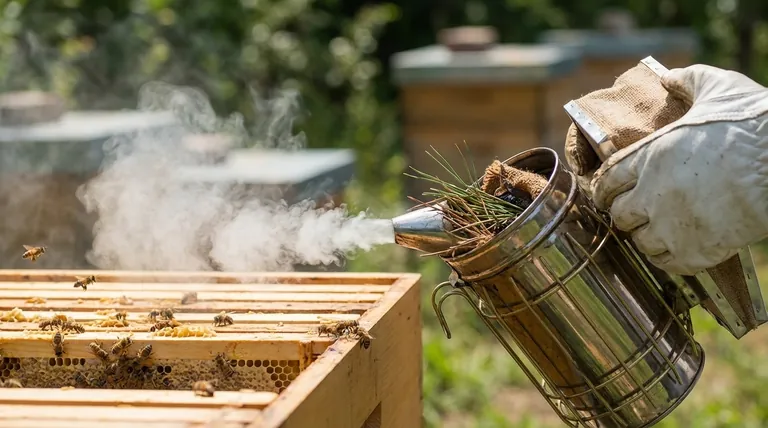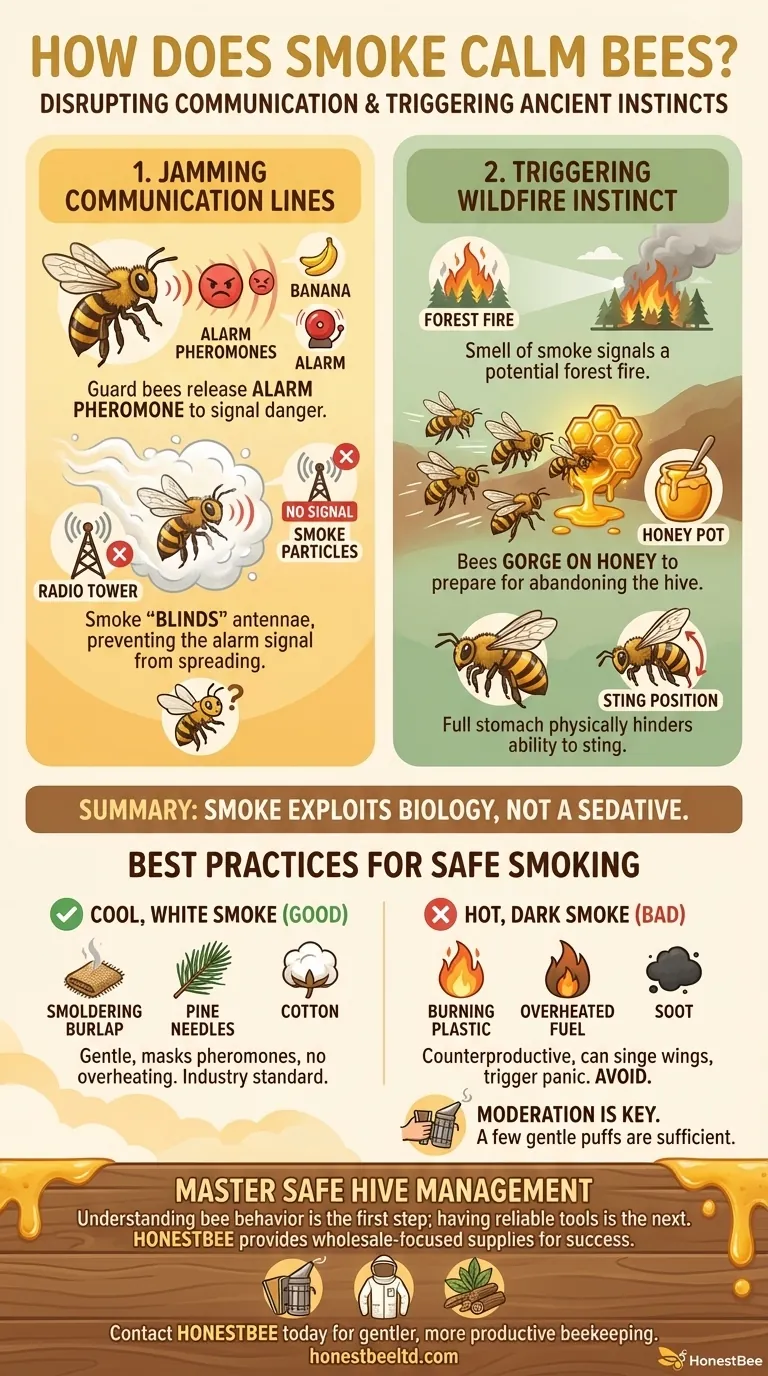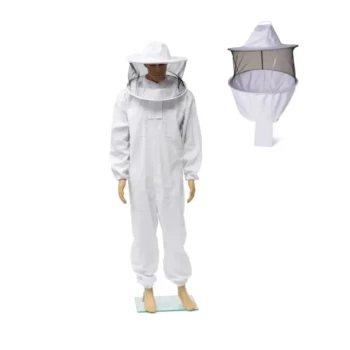In short, smoke calms bees for two primary reasons. It disrupts their primary method of communication by masking alarm pheromones, and it triggers an ancient survival instinct related to forest fires, causing them to focus on eating honey rather than defending the hive. This dual-action approach effectively distracts the colony and reduces its defensive posture.
Smoke is not a sedative for bees. Instead, it exploits their natural biology by jamming their chemical "internet" and activating a deep-seated instinct to prepare for abandoning the hive, making them significantly more docile.

Deconstructing the "Calming" Effect
To a beekeeper, a "calm" bee is one that is not trying to sting. Smoke achieves this not by making bees sleepy, but by short-circuiting their ability to mount a coordinated defense.
Jamming the Communication Lines
When a guard bee perceives a threat, it releases an alarm pheromone. This chemical signal, which smells faintly of bananas to humans, instantly alerts nearby bees to the danger and triggers aggressive, defensive behavior.
Smoke particles physically interfere with the bees' ability to detect this pheromone. The smoke essentially "blinds" the antennae receptors that would normally receive the alarm signal, preventing the message of danger from spreading throughout the colony.
Without this chemical signal amplifying the threat, a hive-wide defensive response never gets organized.
Triggering the Wildfire Instinct
For millions of years, the smell of smoke has meant one thing to bees: a forest fire is coming and they may have to abandon their home.
This triggers an immediate survival response. The bees rush to the honeycomb and begin to gorge on honey, loading up on as much fuel as possible for the potential journey to a new home.
A bee that is focused on eating is a bee that is not focused on the beekeeper. This feeding frenzy is a powerful distraction that preoccupies the bulk of the colony.
The Physical Effect of a Full Stomach
There is a secondary, mechanical benefit to this feeding behavior. A bee whose abdomen is full of heavy honey finds it physically difficult to flex its body into the proper "sting" position.
While a full bee can still sting if sufficiently provoked, it is significantly less agile and less inclined to do so.
Understanding the Trade-offs and Best Practices
Using smoke is a technique, and like any technique, it can be done well or poorly. The type of smoke and the amount used are critical factors that determine whether you are calming the bees or harming them.
The Importance of Cool, White Smoke
The goal is to gently simulate a distant fire, not an immediate inferno. Cool, white smoke is the industry standard for a reason.
It is best produced by smoldering, natural fuels like untreated burlap, pine needles, or cotton. This type of smoke effectively masks pheromones without overheating or agitating the bees.
The Danger of Hot, Dark Smoke
Hot, dark, or sooty smoke is counterproductive and harmful. It can singe the bees' delicate wings, cause them to become overly agitated, and be interpreted as an immediate, life-threatening danger.
This can trigger panic and aggression rather than the desired feeding response. It can also introduce harmful contaminants into the honey and wax.
Over-smoking is Counterproductive
A few gentle puffs of smoke at the entrance and under the lid are usually all that is needed. Dousing the hive in excessive smoke can disorient the colony, drive the queen to hide, and cause bees to become agitated as they flee the smoke itself. Moderation is key.
Applying This Knowledge for Safe Beekeeping
Understanding the "why" behind smoking bees allows you to use the tool with precision and respect for the colony's well-being.
- If your primary focus is a quick hive entrance check: A few gentle puffs at the entrance are sufficient to pacify the guard bees and prevent an initial alarm.
- If your primary focus is a full hive inspection: Apply a puff under the outer cover, wait 30-60 seconds for the instincts to kick in, and then proceed, applying minimal smoke as needed to keep communications jammed.
- If your primary focus is hive health and honey purity: Always use clean, natural, and untreated fuel in your smoker to avoid introducing harmful chemicals into your colony's home.
Ultimately, successful beekeeping is a partnership, and using smoke correctly respects the honeybee's complex biology.
Summary Table:
| Mechanism | Effect on Bees |
|---|---|
| Jams Communication | Masks alarm pheromones, preventing a coordinated defensive response. |
| Triggers Survival Instinct | Simulates a forest fire, causing bees to gorge on honey instead of defending. |
| Physical Hindrance | A full abdomen makes it harder for a bee to sting effectively. |
Master safe and effective hive management with the right tools from HONESTBEE.
Understanding bee behavior is the first step; having reliable, high-quality equipment is the next. Whether you're a commercial apiary managing hundreds of hives or a distributor supplying the beekeeping community, HONESTBEE provides the wholesale-focused supplies you need for success.
We supply durable smokers, natural fuels, and a full range of beekeeping equipment designed for professional use. Let us help you work in harmony with your bees.
Contact HONESTBEE today to discuss your wholesale needs and equip your operation for gentler, more productive beekeeping.
Visual Guide

Related Products
- European Stainless Steel Bee Smoker for Honey Bee Hive
- Stainless Steel Honey Bee Smoker Hive and Honeycomb Smoker for Beekeeping
- Premium Traditional Copper Bee Smoker with Bellows
- Economy Galvanized Beekeeping Honey Bee Smoker for Wholesale
- Electric Bee Smoker European Style Bee Hive Smoker for Beekeeping
People Also Ask
- Can you use smoke to get rid of bees? The Truth About Bee Behavior and Control
- Do bees hate the smell of smoke? The Truth About Beekeeping's Most Vital Tool
- Do bee smokers harm bees? The Truth About Safe Hive Management
- How do bee smokers work? A Guide to Calming Your Hive for Safer Inspections
- What are bee smokers made out of? Choose the Right Material for Your Apiary



















